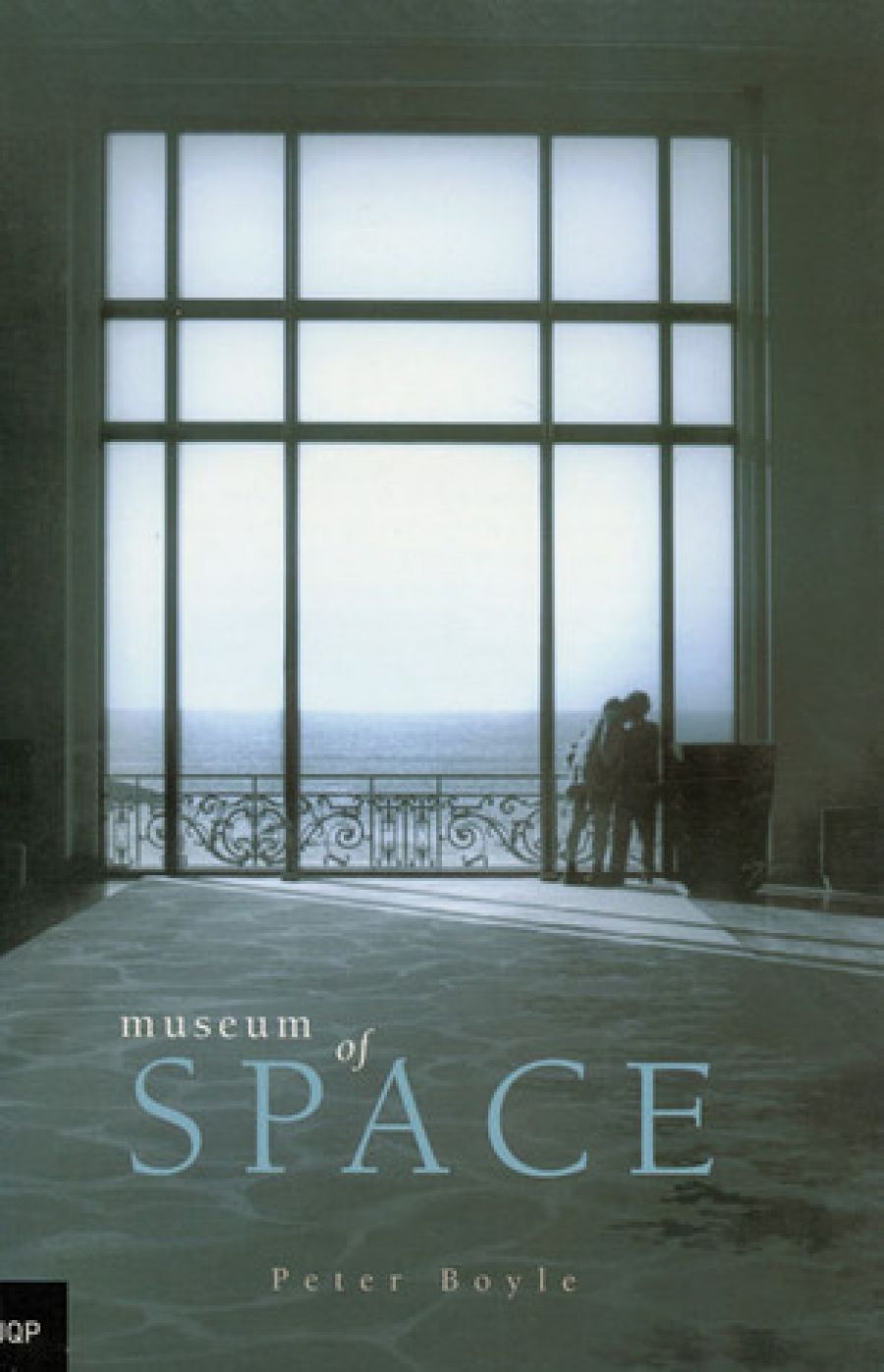
- Free Article: No
- Contents Category: Poetry
- Custom Article Title: Inexhaustible Corridors
- Review Article: Yes
- Article Title: Inexhaustible Corridors
- Online Only: No
- Custom Highlight Text:
‘His poems, now more and more exclusively in prose, have become taut and aphoristic, for he seeks patiently to release energy potential in language, and to make of poetry an instrument of revelation, indeed a close ally of philosophy.’
These words, by R.T. Cardinal in The Penguin Companion to European Literature (1969), in fact gloss the poetry of René Char. They could be taken as an apt description of Peter Boyle’s fourth collection, Museum of Space, which represents a subtle but significant shift in his oeuvre since the virtuoso What the Painter Saw in Our Faces (2001). These are sparer, more abstract poems, less cluttered by competing images – deft, attenuated and often written in a lean, delicate prose, as if having left some of the mechanical devices of poetry behind for something more suggestively metaphysical.
- Book 1 Title: Museum of Space
- Book 1 Biblio: UQP, $22.95pb, 102pp
- Book 1 Cover Small (400 x 600):

- Book 1 Cover (800 x 1200):

Almost half of the pieces in Museum are prose ‘Jottings’ exploring imagined spaces ‘constructed on the ancient alignment of heaven and hell’. I like to think that both Milton and Blake would have delighted in these surreal meditations on some of the big themes: death, God, art and other lives.
Mind you, in ‘Credo’, Boyle writes: ‘Religion is sickness … the mantra that holds the dark in check … the sad white flesh of an old man’s belly.’ And in ‘Beauty’: ‘only then ugliness arrives and leaves you its cookbook for surviving death.’
Like a partisan museum guide, Boyle argues the arts as epistemology, worrying at distinctions whereby the purity of music, in its removal from words and action, limits its efficacy, whereas ‘poetry, unlike music, lives in an interrupted world’. At times, the world looks like a kind of wasteland of plastic bags and old drink bottles in which the birdlike ‘Scavenger’ picks through ‘the code of lost and misdirected letters /the ego’s madness / and in his bag is what is left from our lives’. The landscape is evanescent: a ghostly palimpsest, suggestive of what has been lost. At other times however, there is a wry, comedic wonderment at the fleeting, ambiguous beauties of butterflies and bees. And even ‘Watermelons in Winter’ ‘wallow in the fridge like misdirected whales’.
At their core, these are poems attempting to interrogate: ‘What to make of us / who we are / and if we wanted to be here / are thoughts occurring only / in the wrung-out water of a thousand socks’ (‘Outside the Human’). Boyle is interested in what is seen in sleep, in dream, in visions, as a new way of apprehending what he calls ‘Transhumance’: ‘I wanted to speak of what I saw / inside those places I can hardly image to myself.’ His poetry posits a phenomenological universe without objects but ‘a long white stillness complete in itself’. So this is, above all, poetry of thinking rather than of feeling, of hypothesis rather than conclusion. Margie Cronin, source of the poem titles ‘The Philosopher of Leopards’ and ‘A Shy Boy with Whom Everyone Fell in Love’, writes in her back cover blurb that Boyle’s poetry is centrally concerned with ‘what it means to be human’. However, to me, Boyle’s poems are successful in attempting to play dangerously with escaping the human condition, taking up Keats’s challenge in the ‘Ode on a Grecian Urn’.
Along the way there are lots of delights in the dividual world, as in ‘Where the Roads Go after Nightfall’; using his son’s story about lava ‘rising from the core of things … like a rain that falls in reverse direction, striking open the tight husk that grows around the heart’; or apostrophising a crab: ‘Your being would froth and burn like white acid without the weight of the universe to steady you.’ Or the tantalising possibilities of ‘Apologising to Unicorns’: ‘They rarely understand our purposes … Unicorns sleep most comfortably in heavy traffic where the hum of self-absorbed commuters leaves them invisible … Stripped back to primordial desecration, our hearts still yearn for unicorns … [they] are reluctant to abandon their legend of our existence. Our one virginity is that we are not yet born.’
At the heart of these conceptually sinuous poems is a poignant desire: ‘Will there ever be a time / when love holds us perfectly bound / completely disconnected from the world / completely enclosed within itself / and free and just our-selves / and no-one else?’ Boyle’s answer is, I think: ‘We spend a lifetime losing the perfection of an instant.’
‘These are poems in which intense imagery … [has] the quality of myth or oracle, of a voice speaking in symbols from within a realm where it is not “I” who feels or knows “something” about “it” but I and it become one in a single …feeling, the “thing” itself of life – which also utters itself as word, as equally non-personal art, the thing as poem and the poem as thing.’ Words again from The Penguin Companion to European Literature – this time by A.K. Thorlby, writing about Rilke. Peter Boyle has shown himself to be a poet with many voices, and some of the tones come from echoes of his translations from Spanish, French and German poetry. Indeed, I came to think of his poems as kinds of translations in which the poet is the mediator between an original voice or idea, working in the mutable, ‘composting’ of language: ‘a joining art, both pragmatic and utopian’ (to use Nicholas Jose’s recent terms).


Comments powered by CComment